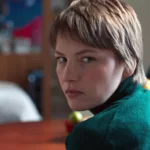Nocturnal Animals
Directed by Tom Ford
Starring Amy Adams, Jake Gyllenhaal, Michael Shannon, Aaron Taylor-Johnson, Laura Linney
[rating: 4/5]
Reviewed by Michael Dalton
From the opening shot of Tom Ford’s new film Nocturnal Animals, you know you’re at the mercy of an artist in love with the medium and all the possibilities it affords. Naked, obese woman are dancing in slow motion with every fold of fat warbling grotesquely as shiny red confetti rains around them. It’s confronting and challenging, and as hard to look at as it is to ignore. As Ford’s camera pulls back, we discover we’ve been viewing a performance piece at an art gallery. It is merciless as it plays out and merciful when it ends, and of course mercy, and hoping for it, is the name of this game. It’s a tough task Ford has set himself here, pitting three stories against each other where the emotional complexities are paramount to understanding the how and the why. Ford, one of the most famous fashion designers in contemporary culture, is ripe for accusations of superficiality and many felt his previous film, A Single Man, was just that, despite stunning performances by Colin Firth and Julianne Moore and a moving finale. By comparison, that film was all surface area but here, he wants you to dig deep. This is modern day noir where nothing is as simple as it seems and a black heart waits at the centre.
There are three stories to explore. One concerns Susan Morrow (Amy Adams) whose ex-husband Edward Sheffield (Jake Gyllenhaal) has sent her a manuscript called “Nocturnal Animals” about a family, Tony Hastings (Gyllenhaal again) and his wife Laura (Isla Fisher) and daughter India (Ellie Bamber), on a roadtrip who are accosted on a lonely highway by three thugs (they will show no mercy either). The second story is about Susan and Edward’s marriage and its breakdown 20 years before, and the third examines Susan’s unfulfilling reality in which she runs a high end art gallery while her handsome, cold husband (Armie Hammer) is off philandering. The novel, and it shakes Susan to her core, is nothing less than a deafening scream by its author. His anguish over Susan’s final act of betrayal at the end of their life together left him in pieces and the novel, a brutal metaphor, is drenched in the pain Edward has lived with ever since. As much as the film is a search for personal mercy it gradually grows into a story of regret. Nocturnal Animals, as it plays out, is a valiant attempt to ask “What if?” and it reflects back like a laser on Susan.
Adams is sensational. She’s never been made up for a character quite like this before. There’s a scene where she’s alone and prowling her exquisitely designed, dimly lit home and Abel Korzeniowski’s score all but wraps her up; it recalls Brian De Palma’s fetish for eroticising the vulnerability of his heroines. She is beautiful, and in a terrain unlike anything we’ve seen her traverse before, she does some of her best work. She has the most incredibly expressive eyes (they could tell a hundred stories) and Ford exploits them and, as stiff and stricken as Susan is, Adams finds a way to make her appealing. Gyllenhaal, in one of his softest roles, is hypnotic. As both Edward and Tony, he has to bow down and watch helplessly as his life spins out of his control. Gyllenhaal has played it tough, lovesick, ruthless, obsessed, and world-weary, but Tony will be remembered as one of his most fascinating portrayals. There are layers here and he peels them back effectively. Michael Shannon, hardly handsome in the classic sense, is beautifully framed as well. As the lawman in Edward’s novel, he is noir absolute, smoking, leering, and more than ready to escort Tony to the dark side.
The curious element of the film however is in the aesthetic. Its carefully decorated and dressed (of course) yet Ford shoots a few bullseyes at the way we live today. Jena Malone, trussed up in a stylish leather harness, as Sage, a colleague of Susan’s, waxes happily over a new app on her phone that lets her watch her baby at home. She comes off more like a caricature, a symbol, and amidst the poised atmosphere, you have to giggle at her ludicrousness especially when Susan accidentally breaks her phone and Sage sniffs that the new model is released next week. It’s the same with Susan’s tailored wardrobe, even her loungewear is chic, and both she and her husband have handsome assistants. These are the elements that will invite criticism (some critics have torn the film to pieces on this score alone) but I think Ford wants you to laugh at the perfection. There’s plenty going on here, and it’s all colliding like a perfect storm. You won’t be able to tear your eyes away, even when you wish you could.




